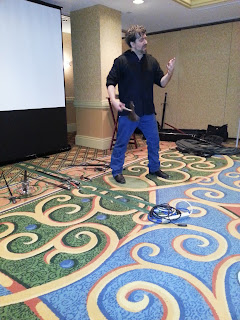It's been a tremendous twelve months. A new job and health issues have impacted my writing time, but I'm still at it, trying to wrap up the second half of Vlad Dracul's story in Order of the Dragon - Book Two.
For those who've read my novels in the past, you know that I'm an obsessive researcher and try to get the details right. That's meant scrapping my novella about Vlad's eldest son Mircea, whose actions can't entirely be separated from his father's own, and requiring me to narrow my focus to the other two sons, Radu and Vlad the Monk. What about Vlad Dracula, you may ask? The inspiration of the vampire legend? He appears in each of my novels and novellas about his family, almost as a force of nature, but I have very specific reasons for choosing NOT to make him a protagonist in a third novella. One, Vlad Dracula has been done to death in fiction. The reality of his life AND the myth of his being a vampire (thanks ever so much, sarcastically, to Bram Stoker, as the real Vlad Dracula was WAY MORE INTERESTING). There's nothing new or nuanced that I could reveal about his experiences. Besides, I find his father and brothers equally interesting figures whose stories deserve to be told. Two, if you want to read one of the best portrayals of him in fiction, get a copy of C.C. Humphrey's Vlad: The Last Confession. You will be immersed as I was.
Since 2005, I've been blessed to share a friendship and partnership with author Mirella Patzer, but this year marked the culmination of a novel we've been working on since 2019, when she visited me during one boiling August here in Barbados. As I'm known for writing fiction set in Europe's Middle Ages, this novel, tentatively titled The Ordeal of Alice Clifton, is a complete departure from that period and takes readers to 18th century Philadelphia in the aftermath of the American Revolution. The novel tells the story of a real-life figure, the mulatto slave Alice Clifton, who endures the attentions of a brutal man related by marriage to the first Speaker of the House of Representatives. His rapes result in her pregnancy, and when her daughter dies, she is accused of infanticide. But for her trial and the intervention of the then leader of the Philadelphian government, Benjamin Franklin, no one would ever know Alice Clifton once existed. Mirella and I are shopping around for a home for our great collaboration. I'll announce future publication plans here.
By the way, Mirella's newest novel, Her Secret Legacy, just made its debut on December 1. If you weren't aware of her or her work, why not get started with a copy of her latest today.
My attention to detail in the Sultana series of novels also offered another chance to collaborate with an author whom I admire; David Blixt. He may not remember, but I first encountered him while attending a session he conducted at the Historical Novel Society's 2013 conference entitled, "Swordplay and Its Influences on Culture." Read all about his session here - and you can ask me sometime why I wore a dress and sandals to an event where attendees handled real swords! Little did I know back then that five to six years later, David and I would work together on an anthology, We All Fall Down: Stories of Plague and Resilience (2020). His contribution made me cry. It's rare for an author's words to have such a profound effect on me. If you haven't read his stories, get started here today. And not just because he and I are working on a project partly set in Moorish Spain that you'll want to read! More details about our work in the future.
Most recently, that obsession with Moorish Spain's history also led a doctoral student at the University of Granada to contact me regarding her thesis, which focuses on the sultanas of Granada, but also examines the importance of historical fiction. I'm a prodigious reader and history buff and will admit, I struggle with those who say they don't enjoy reading or find history dull. It was a great honor to share some correspondence with the student and to reflect on the questions she asked. As I told her, Moorish Spain has lived on in my head and heart for over thirty years. Ever since I was a freshman in college, where I first discovered the Islamic presence in Europe and how it was eradicated. I also related to the student that historical fiction's best service to history and historians is to evoke interest in the past, keeping history alive and relevant to our experiences today, and firing the imagination of readers. My motivation for continuing to write.




